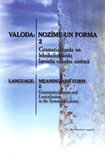Leksēmas Mann/man gramatizēšanās latviešu valodā
Grammaticalization of the Lexeme Mann/man in the Latvian Language
Author(s): Iveta PūteleSubject(s): Language and Literature Studies, Lexis, Baltic Languages
Published by: Latvijas Universitātes Akadēmiskais apgāds
Keywords: desemantizēšanās; gramatizēšanās; aizgūts saliktenis; jaundarinājums;
Summary/Abstract: With the advent of the German language and its establishment in Latvia along with other borrowings compounds containing the element -manis, which in German is the lexeme Mann ‘man’ came into the Latvian language. In mid-19th century and the first half of the 20th also compounds borrowed from English with the lexeme man as the second component enter the Latvian language.From the point of view of Latvian these words containing the element -manis/ -menis have lost the characteristics of a compound. In Latvian this borrowing becomes a coherent entity used for designation of some objects and the second element is no more related to any certain lexical meaning. Thus one of the characteristics of grammaticalization is brought about, namely – desemantisation. The German lexeme Mann and the English lexeme man in Latvian lose their lexical meaning and become grammaticalized, taking on the functions of a suffix (or correspondingly – final, suffix plus ending). A lower level of grammaticalization is observed in words where the element -manis/-menis is part of the borrowing.A more pronounced grammaticalization is observed not in the borrowings but in new formations with the finale -manis/-menis, as in this cases it has more pronounced characteristics of an affix, furthermore – it actually performs the functions of an affix in the word-building process.The element -man- displays the most pronounced postfix function and with that – grammaticalization level in the modern colloquial formations, as in these cases the finale -manis/-menis is attached to the stem without noticing its lexical meaning.
Journal: Valoda: nozīme un forma
- Issue Year: 2012
- Issue No: 2
- Page Range: 115-120
- Page Count: 6
- Language: Latvian

